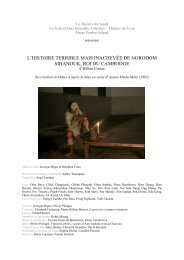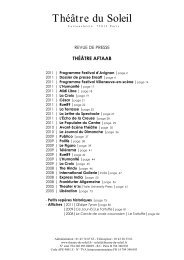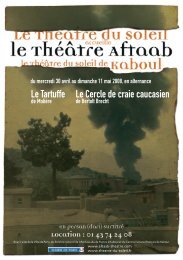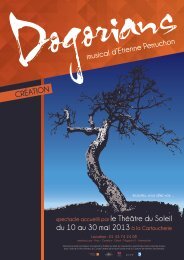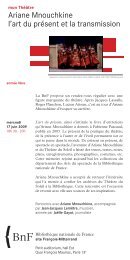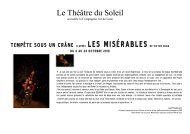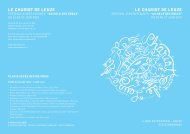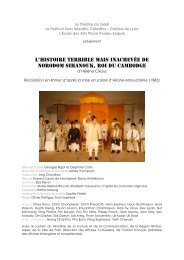les personnages de l'histoire terrible... - Le Théâtre du Soleil
les personnages de l'histoire terrible... - Le Théâtre du Soleil
les personnages de l'histoire terrible... - Le Théâtre du Soleil
You also want an ePaper? Increase the reach of your titles
YUMPU automatically turns print PDFs into web optimized ePapers that Google loves.
The Khmer-language staging of Sihanouk has been conceived as providinga kind of critical counterpoint to another historic internationalstaging of Cambodian history: the UN-backed International Tribunalset up to try the crimes of the Khmer Rouge, currently in session inPhnom Penh. The Tribunal represents a significant <strong>de</strong>velopment in thehistory of international UN-sponsored tribunals since Nuremburg fora number of reasons… Yet its mandate is limited, and will leave unanswereda number of fundamental questions… By adopting a narrowlynationalist frame and limiting chronological jurisdiction to the exactperiod of Khmer Rouge rule the Tribunal’s remit does not inclu<strong>de</strong>actors or actions beyond Cambodia’s bor<strong>de</strong>rs, favouring instead theconstruction of a strictly Cambodian story of villains and victims.La création <strong>de</strong> la pièce au Cambodge aujourd’hui, avec <strong>de</strong> jeunes artistes khmers, participe <strong>de</strong>s enjeuxliés à la mémoire <strong>de</strong>s évènements historiques que la pièce relate. C’est pour <strong>de</strong>s raisons politiques quele Tribunal <strong>de</strong>s crimes khmers rouges, instauré en 2006, se limite à juger une poignée <strong>de</strong> dirigeantskhmers rouges agissant dans une pério<strong>de</strong> restreinte, <strong>de</strong> 1975 à 1979. Répondant à d’autres exigencesd’ordre politique, certes, mais transcendant cel<strong>les</strong> structurant la « justice » internationale, la piècecouvre une pério<strong>de</strong> historique plus large (1950-1980), mettant ainsi en scène et en question un éventail<strong>de</strong> <strong>personnages</strong> bien plus grand, allant <strong>de</strong>s acteurs khmers à ceux <strong>de</strong>s gran<strong>de</strong>s puissances.La mise en scène délocalisée <strong>du</strong> Sihanouk... est au centre d’une nouvelle approche <strong>du</strong> débat traitant <strong>les</strong>spécificités d’un contexte culturel où se déploient <strong>de</strong>s conceptions globalisées <strong>de</strong> la mémoire publiqueou civique, <strong>du</strong> mémorial, et <strong>du</strong> procès <strong>de</strong> l’Histoire - Plus jamais ça. Est-ce qu’une certaine mémoire(et laquelle ?) peut prévenir la répétition, à l’avenir, <strong>du</strong> passé ? Ce projet implique la tra<strong>du</strong>ction, dansl’idiome linguistique, culturel, politique d’une post-colonie, d’une pièce historique mo<strong>de</strong>rne traitantd’un héritage colonial, écrite pour un public occi<strong>de</strong>ntal.Ashley ThompsonHowever these are perhaps not simply contingent political limitationsimposed on an otherwise unassailable juridical process. The Tribunalitself constitutes a significant intercultural intervention into Cambodiansociety, history and memory, the implications and consequencesof which remain to be a<strong>de</strong>quately explored. The long philosophicaland institutional traditions of which the tribunal, as a court of justice,is a pro<strong>du</strong>ct are culturally and historically <strong>de</strong>termined; they do nothave universal applicability. In<strong>de</strong>ed, the Western institutions of thetheatre and the tribunal have been intimately linked ever since theyarose together, along with the emergent political institutions of thesovereign <strong>de</strong>mocratic state, in ancient Greece. It is our contention thatin or<strong>de</strong>r to formulate a meaningful assessment of the possibilities andlimits of the Khmer Rouge Tribunal it is necessary to situate the latterin the context of the long history of these Western institutions.… this theatre, very much situated in the tragic tradition, is able topoint out the limitations of politics and the tribunal, by staging somethingthat exceeds them… perhaps the theatre is capable of stagingwhat it cannot comprehend. Perhaps it does not necessarily, inadvance, on principle, simply banish the ghost. A certain theatre, atleast, may admit, may allow, a kind of haunting. It broods over theever-present threat of return, and over the compromises ma<strong>de</strong> in thename of progress.Eric Prenowitz and Ashley Thompson, ‘Cambodia’s Trials: Theatre, Justice and HistoryUnfinished,’ in M. Cohen and L. Noszlopy, eds., Contemporary Southeast Asian Performance:Transnational Perspectives, Cambridge Scholars Publishing, 2010, extract frompp. 82-90.16



